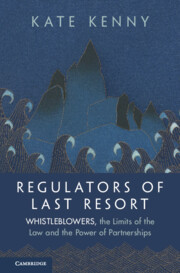Book contents
- Regulators of Last Resort
- Regulators of Last Resort
- Copyright page
- Dedication
- Contents
- Acknowledgements
- Prologue
- 1 When Official Channels Fail Whistleblowers
- 2 Lawfare Tactics and Legal Advice at Theranos
- 3 Whistleblowing Subcultures at Amazon
- 4 The Facebook Whistleblower and the Journalist
- 5 Advocates and the Immigration Detention Centre
- 6 Public Whistleblowing as Collective Bricolage
- Appendix 1 Ignoring Public Whistleblowers: Literature, Method and Analysis
- Appendix 2 A Legal Revolution
- References
- Index
- References
References
Published online by Cambridge University Press: 05 December 2024
- Regulators of Last Resort
- Regulators of Last Resort
- Copyright page
- Dedication
- Contents
- Acknowledgements
- Prologue
- 1 When Official Channels Fail Whistleblowers
- 2 Lawfare Tactics and Legal Advice at Theranos
- 3 Whistleblowing Subcultures at Amazon
- 4 The Facebook Whistleblower and the Journalist
- 5 Advocates and the Immigration Detention Centre
- 6 Public Whistleblowing as Collective Bricolage
- Appendix 1 Ignoring Public Whistleblowers: Literature, Method and Analysis
- Appendix 2 A Legal Revolution
- References
- Index
- References
- Type
- Chapter
- Information
- Regulators of Last ResortWhistleblowers, the Limits of the Law and the Power of Partnerships, pp. 224 - 242Publisher: Cambridge University PressPrint publication year: 2024

